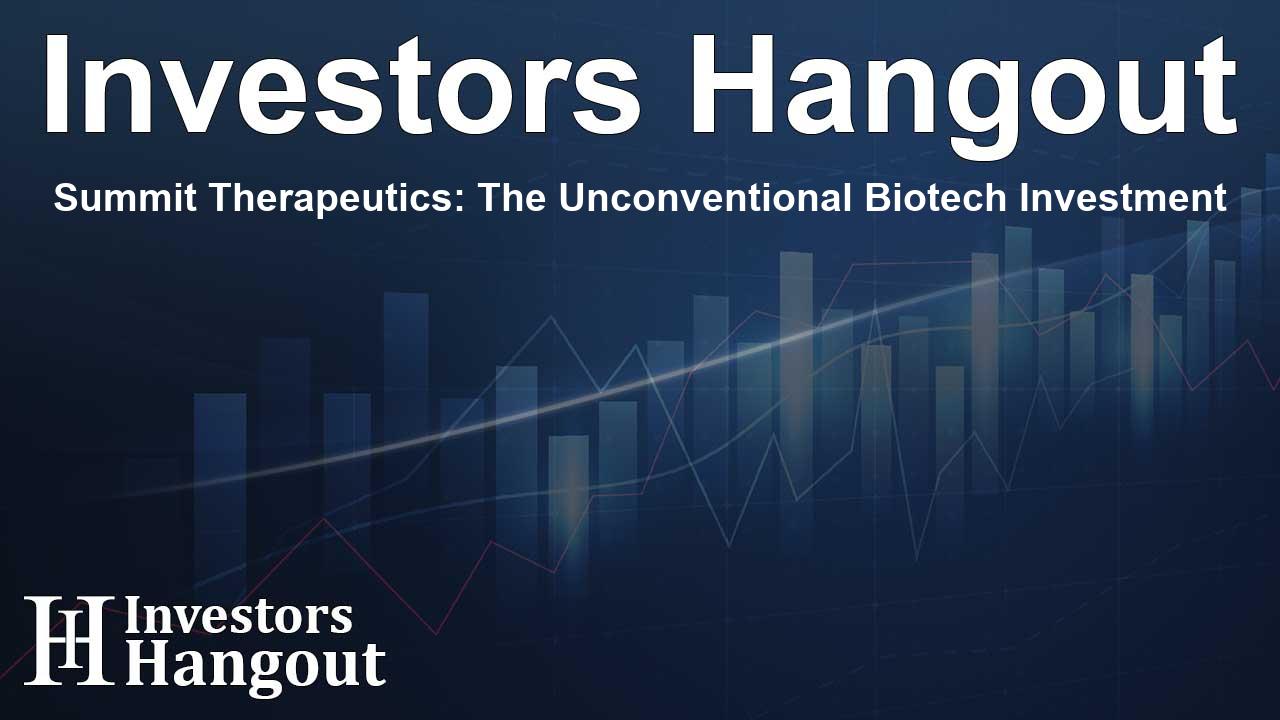Summit Therapeutics: The Unconventional Biotech Investment

Summit Therapeutics: An Overview
When investing in promising companies, the prospect of significant returns often comes with the acceptance of higher risks. This balance between potential reward and risk is something many investors face, especially in the biotech sector. One company that stands out due to its extraordinary valuation and considerable potential is Summit Therapeutics (NASDAQ: SMMT).
As of now, Summit has a market capitalization that has soared past $23 billion in recent weeks, posting an astonishing increase of over 1,100% in its stock value this year. What makes this rise more remarkable is that the company has not generated any revenue in the past 12 months. So, what is driving such a high market cap?
The Game-Changing Drug Candidate
The surge in Summit's valuation is primarily linked to its promising drug candidate, ivonescimab. This standout product has investors buzzing with excitement due to its potential to rival some of the leading oncology therapies on the market today. One of its main competitors is Keytruda, a well-known cancer treatment.
Keytruda has practically set the bar in oncology, generating approximately $25 billion in sales for its parent company, Merck, last year. Data recently announced by Summit revealed that ivonescimab demonstrated greater efficacy in treating advanced non-small cell lung cancer than Keytruda in a phase 3 clinical trial. According to the trial results, ivonescimab lowered the risk of death or progression of disease by as much as 49% over Keytruda. Specifically, patients treated with ivonescimab enjoyed a median progression-free survival of 11.14 months, compared to just 5.82 months with Keytruda.
Are Market Expectations Too High?
The excitement surrounding these results is palpable, and rightfully so. The successful development of an effective cancer drug could lead to substantial revenue growth for Summit. However, it is crucial to remain cautious—investors should not jump to conclusions based solely on these early results.
Merck, with its established portfolio of drugs, presents a significantly more stable investment compared to Summit. With Merck, investors can rely on multiple revenue streams and consistent profits, whereas Summit's future hinges on the success of ivonescimab. Should the company face any unfavorable news or setbacks regarding its clinical trials, the impact on its stock price could be severe.
The Need for Broader Trials
Another point of concern arises from the trial populations used in Summit's studies. The recent trials were conducted primarily on a Chinese demographic. For ivonescimab to gain approval in the U.S. and ultimately be successful, it must demonstrate its efficacy across a broader and more diverse patient population. If the drug's effectiveness can’t be substantiated in different demographics, future market acceptance may be limited.
Investment Considerations
Given Summit's impressive market cap and promising drug candidate, investors may wonder whether now is the right time to invest in Summit Therapeutics. While there is potential for significant returns, the risks remain substantial due to the level of uncertainty in the biotech field. Its clinical results, while optimistic, should be evaluated carefully against those of established competitors like Keytruda.
This year, Keytruda received approval for a 40th indication, underscoring its extensive utility across a diverse range of cancers. Therefore, while ivonescimab may show better outcomes for a specific type of cancer, it is essential to recognize that Keytruda's broad effectiveness remains unrivaled.
Summit's elevated market cap equates to a high level of risk, especially for investors who are uncomfortable with uncertainty. A negative shift in ivonescimab's outcomes could lead to a sharp decline in Summit's stock price, underscoring the precarious nature of such investments.
Ultimately, potential investors should weigh the prospects of ivonescimab’s development against Summit’s current valuation and their personal risk tolerance. A well-researched approach to investing will provide clarity in making such decisions.
Frequently Asked Questions
What is Summit Therapeutics known for?
Summit Therapeutics is primarily recognized for its promising drug candidate, ivonescimab, which is currently in clinical trials.
Why has Summit's stock surged recently?
The increase in Summit's stock is mainly due to its reported phase 3 trial results, where ivonescimab showed impressive efficacy against advanced non-small cell lung cancer.
How does ivonescimab compare to Keytruda?
In recent trials, ivonescimab demonstrated better performance than Keytruda by reducing the risk of disease progression or death significantly more than its competitor.
Is it a good time to invest in Summit Therapeutics?
While Summit holds potential for great returns, the risks are high due to its lack of diverse trial data and the possible volatility of its stock price.
What factors might affect Summit's market cap?
Summit's market cap will be influenced by the outcomes of ivonescimab’s clinical trials, regulatory approvals, and its ability to generate revenue in the future.
About The Author
Contact Hannah Lewis privately here. Or send an email with ATTN: Hannah Lewis as the subject to contact@investorshangout.com.
About Investors Hangout
Investors Hangout is a leading online stock forum for financial discussion and learning, offering a wide range of free tools and resources. It draws in traders of all levels, who exchange market knowledge, investigate trading tactics, and keep an eye on industry developments in real time. Featuring financial articles, stock message boards, quotes, charts, company profiles, and live news updates. Through cooperative learning and a wealth of informational resources, it helps users from novices creating their first portfolios to experts honing their techniques. Join Investors Hangout today: https://investorshangout.com/
The content of this article is based on factual, publicly available information and does not represent legal, financial, or investment advice. Investors Hangout does not offer financial advice, and the author is not a licensed financial advisor. Consult a qualified advisor before making any financial or investment decisions based on this article. This article should not be considered advice to purchase, sell, or hold any securities or other investments. If any of the material provided here is inaccurate, please contact us for corrections.
